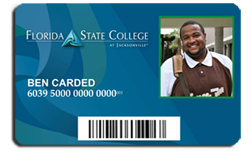Colorado State University is making on-campus luxuries like dining and laundry services more accessible to non-CSU students with the introduction of RamCash Express, reports to a campus student newspaper.
The RamCash Express card enables off-campus, non-CSU students to pre-load money onto a card, much like a retail gift-card, and purchase food on-campus venues and pay for laundry services.
Traditional RamCash can be loaded on to a student’s CSU identification card, or RamCard, and used to buy food at on-campus venues. It can also be used to pay for temporary parking on campus and parking citations.
Read more here.

The University of Denver’s Daniels College of Business is always looking for technical innovations they can introduce on campus to better educate students. They need to be familiar with the latest technology for us to be seen as legitimate by the industry, says David Corsun, the director of Daniels’ School of Hotel, Restaurant and Tourism Management.
That’s why the school is partnering with Denver-based mobile payments provider Mocapay Inc. to enable customers at Beans, the student-run coffee shop, to make payments with their mobile phones.
Beans customers have the option to download a Mocapay app to their phone. To make a purchase, they launch the app, enter the transaction amount, and then receive a unique six-digit code on their phone. They provide the code to the cashier and the amount is deducted from their prepaid account.
Merchants can opt to have customers punch the six-digit code into a pin pad or have a bar code sent to the customer’s phone for scanning at the POS. “We are agnostic as to what your point-of-sale process is,” says Kevin Grieve, Mocopay’s chief executive officer, but whatever process is used, “no customer-sensitive information is stored on the phone or passed to the merchant.”
“We’re the first to market with this solution,” he adds. Mocapay conducted trials from 2007 to 2009 and now supports merchant-branded gift and loyalty programs at 125 locations in several states.
Mocapay also uses its mobile platform as a marketing tool. Users receive alerts when new merchants join the service, customer satisfaction surveys and occasional reminders about their remaining balance.
Corsun says academic institutions need something like Mocapay for several reasons. The first is simple convenience.
“We know that most of our students have smart phones and many are reliant on their parents for their spending cash,” he says. With Mocapay, parents can replenish the accounts online or students can add funds from their mobile phones.
Mocopay’s software-as-a-service delivery model meant, “there was no hardware cost to us,” says Corsun, stressing that it’s difficult for colleges to get funds for any new capital investment in the current economic environment.
But most important for Daniels College, all of their students take a technology course that will now include studying the Mocapay project alongside a multitude of software systems used in the hospitality industry. “We see [mobile payments] as something that is going to be pervasive and our students need to know how to operate it. They’re not just learning that Mocapay exists, they’re going to learn the way it adds value.”
Grieve says the Daniels deal will pay future dividends, noting that, “as a young company, we need to build awareness and let people know what we can do.” The best way to do that is to “target industry leaders and innovative merchants, and students are the next crop of industry leaders.”
Students at Arizona-based Prescott High School are protesting the school’s newly enforced ID badges by taping them to their foreheads, making them into t-shirts, defacing them with their favorite sports teams and cartoon characters and one student even hanging his through the hole in his stretched earlobe, reports The Daily Courier.
The school recently ordered all of its 1,850 students to wear their ID badges at all times when on campus, which the school says is part of a national trend toward visible identification cards to address concerns about school safety and security. Students, however, say the badges clash with their personal styles.
Vice Principal Deb Salcedo understands the student complaints but said the badges address the school’s number one concern, which is safety. “It’s a big school,” Salcedo says. “The IDs will help determine who belongs here.”
In Arizona, high schools in the Mesa and Peoria unified school districts are among others with similar ID badge requirements.
Read more here.
Solano Community College in Fairfield, Calif. has partnered with Higher One to help electronically distribute financial aid and other refund disbursements to its students.
The campus primarily mailed paper refund checks in the past. With the new system students will be able to receive their refund in two additional ways, either direct deposited to a bank of their choice or to a OneAccount, an optional FDIC Insured provided by Higher One.
Newly installed card readers at Texas Christian University will ensure campus libraries remain exclusive to students, according to a campus news report.
With the new readers installed, students entering will now have to swipe their TCU student ID to get in the front door, then again at the turn-styles in the entryway.
The new card readers are not for security purposes, says the campus dean of the library, it was implemented to enhance library use for students by keeping out non-students during the later hours.
Read more here.
 Florida State College at Jacksonville and CardSmith announced the launch of the new Essential Card program for the campus community.
Florida State College at Jacksonville and CardSmith announced the launch of the new Essential Card program for the campus community.
The Essential Card program, FSCJ’s student ID, is powered by CardSmith’s SaaS transaction processing system and card program management solution. Essential Card’s initial objectives are photo identification, library circulation services, implement student pay for printing and eliminate cash and coins for printing and copying transactions.
For print and copy management, the college utilizes CardSmith’s PCounter Pro transaction processing system to enable real-time balance display and payment for Essential Card transactions.
In addition, the Essential Card also features an optional spending account, backed by Essential Bucks, which enrolled students, faculty and staff can use at accepting locations on each of the Florida State College’s 12 campus center locations in Jacksonville. Through CardSmith, Essential Bucks accountholders can add value online 24/7.
HID Global unveiled a new access-control reader and credential offerings that provide an options for migrating from legacy solutions to 13.56 MHz contactless smart card technologies. HID readers can be used with single- and combination-technology cards including a dual-high frequency credential.
HID’s expanded offering includes:
HID will be demonstrating its full line of readers and credentials at Security Essen 2010, October 5-8 in Hall 12, stand #216, at the Essen Trade Fair Ground in Essen, Germany, and at ASIS International 2010, October 12-14 in Booth #601 at the Dallas Convention Center in Dallas, Texas.
HID’s iCLASS dual HF reader and multiCLASS non-keypad migration readers are available now, and the iCLASS dual-HF credentials will be available in November from the company’s network of distributors, OEMs and system integrators.
College students have found a new way to bypass the new Credit CARD Act - people under 21 years old cannot get a credit card without an adult cosigning - by simply paying older students and graduates to cosign for them, reports The Takeaway.
Students are now having older friends or graduate students sign on to the credit cards, and reportedly businesses have even popped up offering cosigners at a cost. What these people and businesses fail to realize is if primary signature defaults on their credit card debt, the cosigner is just as financially responsible for paying off their debt.

